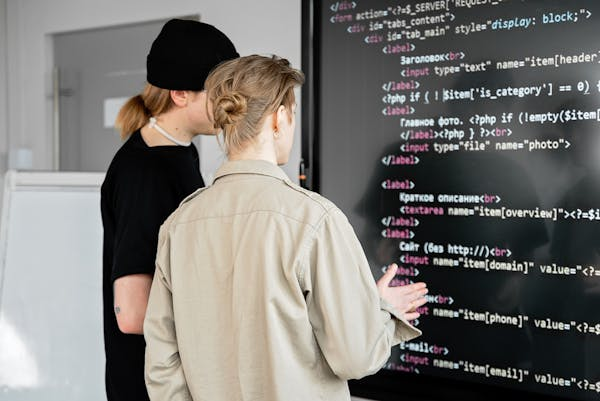The rise of artificial intelligence has sparked both excitement and anxiety across various industries. Developers, the architects of our digital infrastructure, are not immune to these sentiments. Will AI replace developers? The answer is no. Instead, we are witnessing a fascinating evolution: a shift in the developer’s role within an AI-powered world.
From Code Producers to AI Integrators
The traditional image of a developer hunched over lines of code, meticulously crafting every function and algorithm, is gradually transforming. While coding proficiency remains crucial, the emphasis is shifting towards higher-level skills:
- Problem-Solving: AI can automate routine coding tasks, freeing developers to focus on complex challenges that require creative solutions and critical thinking. This shift allows developers to tackle more strategic and impactful projects.
- System Design: As AI systems become more integrated into our lives, developers need to design robust, scalable, and ethical architectures that can handle the complexities of an AI-powered world. This includes ensuring that AI systems are secure, reliable, and aligned with business objectives.
- AI Integration: The ability to seamlessly integrate AI tools and services into existing and new applications will be a highly sought-after skill. Developers will become orchestrators, leveraging AI to enhance functionality, improve user experience, and drive business innovation.
The Enduring Importance of Human Expertise
While AI excels at pattern recognition and automation, it lacks the nuanced understanding and adaptability that human developers possess. Consider these factors:
- Contextual Awareness: AI algorithms can be trained on vast datasets, but they often struggle to understand the context in which they are deployed. Developers provide the crucial human element, ensuring that AI systems are aligned with specific business needs and user expectations. This contextual understanding is essential for developing applications that meet real-world challenges.
- Ethical Considerations: AI bias is a growing concern. Developers play a vital role in mitigating bias and ensuring that AI systems are used responsibly and ethically. This requires careful consideration of data sources, algorithms, and potential societal impacts. Ethical AI development is not just a moral imperative; it’s also a business necessity, as companies face increasing scrutiny over AI ethics.
- Innovation and Creativity: AI can augment human capabilities, but it cannot replace human ingenuity. Developers will continue to be the driving force behind innovation, using AI as a tool to create new and transformative applications. Whether it’s developing AI-powered chatbots, predictive analytics tools, or smart home devices, developers are at the forefront of shaping the future of technology.
Key Skills for Developers in an AI-Powered World
To thrive in this evolving landscape, developers need to acquire new skills and adapt their existing skillsets. Here’s a breakdown of some essential areas:
- Machine Learning Fundamentals: Understanding the basics of machine learning algorithms, model training, and evaluation is crucial for integrating AI into applications. Developers should be familiar with supervised and unsupervised learning techniques, neural networks, and deep learning models.
- Data Science Principles: Working with data is an integral part of AI development. Developers should be familiar with data cleaning, preprocessing, and analysis techniques. This includes understanding data visualization tools and statistical methods to interpret data insights.
- Cloud Computing: AI applications often require significant computational resources. Cloud platforms provide the infrastructure and services needed to deploy and scale AI solutions. Developers should be proficient in cloud services like AWS, Azure, or Google Cloud, and understand how to manage cloud resources efficiently.
- Prompt Engineering: This emerging field focuses on crafting effective prompts for large language models (LLMs) to achieve desired outcomes. As LLMs become more prevalent, prompt engineering will be critical for optimizing AI performance and ensuring that AI systems provide accurate and relevant responses.
- AI Ethics and Governance: Understanding the ethical implications of AI and developing responsible AI practices is essential for building trustworthy systems. Developers should be aware of AI regulations, privacy laws, and ethical frameworks that guide AI development.
Embracing the Change: A Call to Action
The AI-powered world presents both challenges and opportunities for developers. By embracing lifelong learning, adapting to new technologies, and focusing on higher-level skills, developers can not only survive but thrive in this exciting new era. The future of software development is not about being replaced by AI, but about collaborating with AI to build more powerful, intelligent, and human-centered applications.
Developers should be proactive in acquiring new skills and staying updated with the latest AI trends. This includes participating in workshops, attending conferences, and engaging with online communities to learn from peers and industry experts. Moreover, developers should be open to experimenting with new tools and technologies, using platforms like GitHub to explore open-source AI projects and contribute to the global AI community.
Navigating the AI-Powered World: A Skillset Comparison
| Skill Category | Traditional Developer | Developer in an AI-Powered World |
| Core Programming | Essential | Still Essential, but less time spent |
| Algorithm Design | Critical | Important, but AI assists |
| System Architecture | Important | More Critical – Focus on AI Integration |
| Data Analysis | Basic | Essential |
| Machine Learning | Limited | Fundamental |
| Cloud Computing | Growing in Importance | Essential |
| AI Ethics | Minimal | Critical |
| Prompt Engineering | Not Applicable | Emerging and Valuable |
| Problem Solving | Important | Even More Important |
| Creativity/Innovation | Valued | Highly Valued |
Real-World Applications of AI in Development
AI is already transforming various aspects of software development:
- Automated Testing: AI can automate testing processes, reducing manual effort and improving test coverage. AI-powered testing tools can identify bugs more efficiently and predict potential issues before they occur.
- Code Generation: AI can assist in generating boilerplate code, reducing development time and minimizing errors. This allows developers to focus on more complex tasks that require human creativity and judgment.
- Project Management: AI can help manage project timelines, predict deadlines, and optimize resource allocation. By analyzing historical data and current project metrics, AI can provide insights that help developers make informed decisions.
Wrapping it up
The narrative isn’t about replacement; it’s about evolution. The AI-powered world needs skilled developers more than ever, developers who can harness AI’s power while retaining human skills like problem-solving, ethical judgment, and creative innovation. At Moobila, we recognize this shift and are committed to empowering developers with the tools and expertise needed to thrive.
By partnering with Moobila, developers can leverage AI to build innovative applications that drive business success and enhance user experiences. The future is collaborative, and today’s developers are poised to become tomorrow’s AI integrators and innovators. As we move forward in this AI-powered world, the role of developers will continue to evolve, but their importance will only grow.



